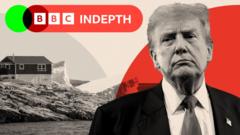Taiwan's President Lai Ching-te recently landed in Hawaii for a two-day visit, stirring up a strong backlash from China amidst ongoing friction between the US and China over Taiwan. The visit, framed as a stop on a broader Pacific tour, occurs against a backdrop of increasing worries about a potential military confrontation over Taiwan.
Taiwan's President Visits Hawaii, Provoking Chinese Dissent

Taiwan's President Visits Hawaii, Provoking Chinese Dissent
Taiwanese President Lai Ching-te's recent trip to Hawaii sparks outrage from China, intensifying geopolitical tensions.
Upon arrival, President Lai emphasized the devastating consequences of war, stating that "there are no winners" and calling for collective efforts to prevent conflict. China's foreign ministry swiftly denounced the visit, lodging serious protests with the US administration.
Taiwan's struggle for recognition is longstanding; viewed by China as a territory that broke away in 1949, Taiwan seeks to assert its sovereignty, while the US adopts a carefully balanced stance, fostering informal relations without officially recognizing Taiwan's independence. Lai, before departing, noted that the trip signifies "the beginning of a new era of value-based diplomacy," highlighting Taiwan's role as a democratic beacon and peace promoter.
Lai reminded attendees at a dinner in Hawaii, featuring state officials and Congress members, of Pearl Harbor's historical significance, reiterating the value of peace in the face of war's futility. Following his Hawaii trip, Lai plans to visit the Marshall Islands, Tuvalu, and Palau, the only Pacific nations acknowledging Taiwan's sovereignty, along with a brief stop in Guam.
In a precursory statement, a spokesperson for China's defense ministry asserted China's strong opposition to any official engagement with Taiwan, vowing to thwart any moves toward Taiwanese independence. The diplomatic friction highlights the fragile nature of relations in the region, particularly as both China and Taiwan assert their positions on the global stage.
Taiwan's struggle for recognition is longstanding; viewed by China as a territory that broke away in 1949, Taiwan seeks to assert its sovereignty, while the US adopts a carefully balanced stance, fostering informal relations without officially recognizing Taiwan's independence. Lai, before departing, noted that the trip signifies "the beginning of a new era of value-based diplomacy," highlighting Taiwan's role as a democratic beacon and peace promoter.
Lai reminded attendees at a dinner in Hawaii, featuring state officials and Congress members, of Pearl Harbor's historical significance, reiterating the value of peace in the face of war's futility. Following his Hawaii trip, Lai plans to visit the Marshall Islands, Tuvalu, and Palau, the only Pacific nations acknowledging Taiwan's sovereignty, along with a brief stop in Guam.
In a precursory statement, a spokesperson for China's defense ministry asserted China's strong opposition to any official engagement with Taiwan, vowing to thwart any moves toward Taiwanese independence. The diplomatic friction highlights the fragile nature of relations in the region, particularly as both China and Taiwan assert their positions on the global stage.






















